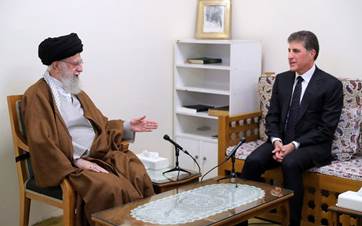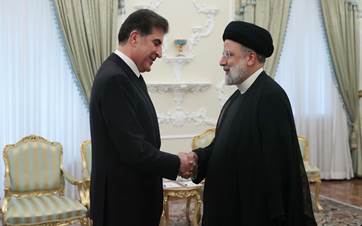Iran


Iran's Supreme Leader Ayatollah Ali Khamenei casts his ballot during the parliamentary runoff elections in Tehran on May 10, 2024. Photo: ATTA KENARE / AFP
ERBIL, Kurdistan Region - Polling stations opened on Friday for a runoff election to determine the remaining members of the Iranian parliament in regions where candidates failed to secure enough votes in the first round.
Iran held its first round of parliamentary elections on March 1, with 15,000 candidates competing for a seat in the 290-seat legislature. 246 candidates were elected in the first round, according to results announced by the Iranian interior ministry
In the second round, candidates vie for the remaining 44 seats in 15 of Iran’s 31 provinces, including the capital Tehran. About 11,500 polling stations have been set up across eight electoral constituencies, according to IRNA.
Iran’s Supreme Leader Ayatollah Ali Khamenei cast his vote in the early hours of Friday and called on Iranians to do the same, stressing that the second round “is just as important” as the first round
“There is no difference between the first and second stages of elections. The second stage complements the first,” Khamenei said addressing the Iranian people, and he labeled the participation in the vote “a national duty.”
“The more votes there are, the stronger the parliament will be, and the stronger the parliament, the more work can be done in the country,” he added.
In the first round of the election in March, the country recorded a voter turnout rate of roughly 41 percent, the lowest since the founding of the Islamic Republic. In the 2020 parliamentary elections, the turnout reached 42.57 percent.
Conservatives and ultra-conservatives won the majority of the parliament in the first round.
The vote was the first since the national Jin Jiyan Azadi (Woman Life Freedom) protest movement in 2022 sparked by the death of 22-year-old Kurdish woman Zhina (Mahsa) Amini while in police custody for allegedly wearing a lax hijab, posed the greatest existential threat to the regime. The protest was met with a brutal crackdown that resulted in Tehran being slammed with more international sanctions.
Friday’s vote took place as Iran is facing numerous internal and external pressures.
Iran’s economy has been crippled by years of sanctions. Inflation is around 50 percent, the local currency has lost significant value, and poverty and unemployment rates are high.
The country also stands at the center of regional tensions stemming from Israel’s war in the Gaza Strip. Pro-Iran groups angry over Washington’s support for Israel have been involved in clashes with the United States-led global coalition against the Islamic State (ISIS), in Iraq, Syria, Yemen, and Lebanon.
Iran held its first round of parliamentary elections on March 1, with 15,000 candidates competing for a seat in the 290-seat legislature. 246 candidates were elected in the first round, according to results announced by the Iranian interior ministry
In the second round, candidates vie for the remaining 44 seats in 15 of Iran’s 31 provinces, including the capital Tehran. About 11,500 polling stations have been set up across eight electoral constituencies, according to IRNA.
Iran’s Supreme Leader Ayatollah Ali Khamenei cast his vote in the early hours of Friday and called on Iranians to do the same, stressing that the second round “is just as important” as the first round
“There is no difference between the first and second stages of elections. The second stage complements the first,” Khamenei said addressing the Iranian people, and he labeled the participation in the vote “a national duty.”
“The more votes there are, the stronger the parliament will be, and the stronger the parliament, the more work can be done in the country,” he added.
In the first round of the election in March, the country recorded a voter turnout rate of roughly 41 percent, the lowest since the founding of the Islamic Republic. In the 2020 parliamentary elections, the turnout reached 42.57 percent.
Conservatives and ultra-conservatives won the majority of the parliament in the first round.
The vote was the first since the national Jin Jiyan Azadi (Woman Life Freedom) protest movement in 2022 sparked by the death of 22-year-old Kurdish woman Zhina (Mahsa) Amini while in police custody for allegedly wearing a lax hijab, posed the greatest existential threat to the regime. The protest was met with a brutal crackdown that resulted in Tehran being slammed with more international sanctions.
Friday’s vote took place as Iran is facing numerous internal and external pressures.
Iran’s economy has been crippled by years of sanctions. Inflation is around 50 percent, the local currency has lost significant value, and poverty and unemployment rates are high.
The country also stands at the center of regional tensions stemming from Israel’s war in the Gaza Strip. Pro-Iran groups angry over Washington’s support for Israel have been involved in clashes with the United States-led global coalition against the Islamic State (ISIS), in Iraq, Syria, Yemen, and Lebanon.







Comments
Rudaw moderates all comments submitted on our website. We welcome comments which are relevant to the article and encourage further discussion about the issues that matter to you. We also welcome constructive criticism about Rudaw.
To be approved for publication, however, your comments must meet our community guidelines.
We will not tolerate the following: profanity, threats, personal attacks, vulgarity, abuse (such as sexism, racism, homophobia or xenophobia), or commercial or personal promotion.
Comments that do not meet our guidelines will be rejected. Comments are not edited – they are either approved or rejected.
Post a comment